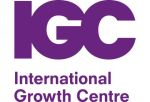 NEWSLETTER ISSUE #5/2018
NEWSLETTER ISSUE #5/2018
|
TRADE and TRADE Advisory take the DSM to Rwanda; Southern African DSM user group gathers for 3rd annual conference
Expanding and diversifying its exports has become an urgent priority for the government of Rwanda, a country that has been attracting increasing international attention for the pace of its economic reforms and its outlook-looking approach to trade and foreign direct investment. In an initiative driven by the International Growth Centre (ICG) at the London School of Economics (LSE), TRADE has been assisting the country with its market expansion efforts, using the TRADE-DSM (Decision Support Model)® to identify and prioritise high-potential export opportunities. According to Mr Martin Cameron, managing director of TRADE Advisory (the NWU spin-out company where much of the ongoing development work for the DSM takes place): ‘Rwanda has a number of strengths, including its expanding manufacturing capacity, that make it an ideal trading partner for various countries in Europe, North America, and Eastern and South-East Asia. Among its current high-potential export sectors, according to the DSM findings, are processed agricultural products, agrochemicals, specialised textiles and garments, construction materials, and metal and wood products. Interestingly, too, the country has export diversification potential in the (as-yet-unexplored) areas of aeronautical maintenance, mining and drilling maintenance, and plastics manufacture.’ By pinpointing the most promising export opportunities in high-potential markets from innumerable worldwide country-product combinations (using a sophisticated ‘screening’ methodology), the DSM approach shortens the time it would normally take to identify export markets and adds crispness and accuracy to the decision-making process. ‘The added value of the DSM approach for Rwanda’, added Martin, ‘is that for each product under consideration, it provides a detailed overview of which markets currently demand the product and where Rwanda’s additional export potential lies, taking into account factors such as trade costs and import tariffs. This evidence-based analysis complements the general thrust of Rwanda’s existing National Export Strategy.’ TRADE, together with TRADE Advisory, conducts regular workshops and refresher sessions for the growing TRADE-DSM® user base, which is drawn from national and provincial government structures in South Africa as well as trade promotion bodies in other southern African countries. While these gatherings are geared towards enabling users to take full advantage of the TRADE-DSM®, they typically also delve into the economics and logistics of international trade, thus broadening users’ understanding of the complexities of operating at a regional or global level. The 3rd annual conference for Southern African users of the TRADE-DSM® took place on 13 and 14 March 2018. |
|
TRADE and TRADE Advisory take the DSM to Rwanda; Southern African DSM user group gathers for 3rd annual conference
Archive newsletters
|

